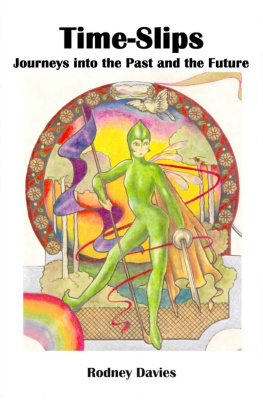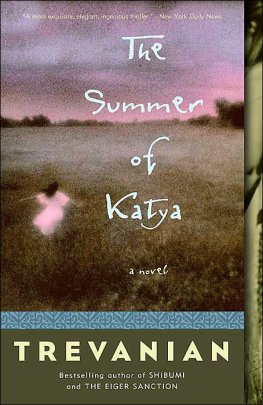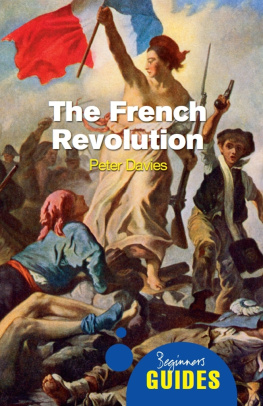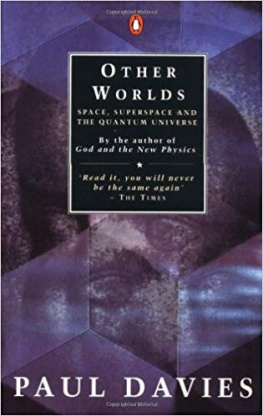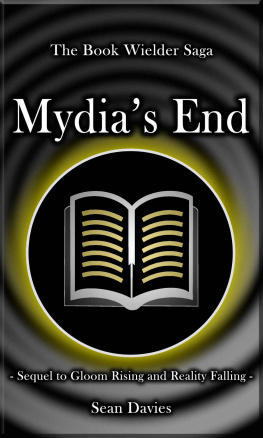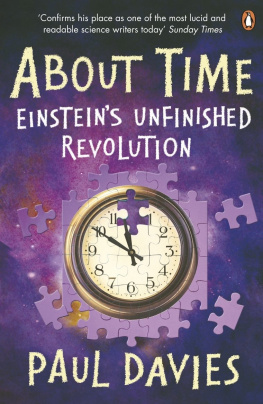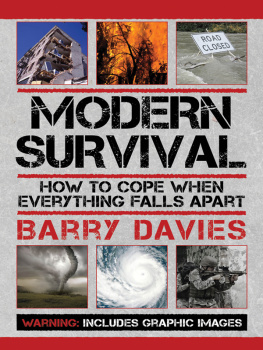Rodney Davies - Time-Slips: Journeys Into the Past and the Future
Here you can read online Rodney Davies - Time-Slips: Journeys Into the Past and the Future full text of the book (entire story) in english for free. Download pdf and epub, get meaning, cover and reviews about this ebook. year: 2019, publisher: Beccles Books Ltd, genre: Detective and thriller. Description of the work, (preface) as well as reviews are available. Best literature library LitArk.com created for fans of good reading and offers a wide selection of genres:
Romance novel
Science fiction
Adventure
Detective
Science
History
Home and family
Prose
Art
Politics
Computer
Non-fiction
Religion
Business
Children
Humor
Choose a favorite category and find really read worthwhile books. Enjoy immersion in the world of imagination, feel the emotions of the characters or learn something new for yourself, make an fascinating discovery.
- Book:Time-Slips: Journeys Into the Past and the Future
- Author:
- Publisher:Beccles Books Ltd
- Genre:
- Year:2019
- Rating:5 / 5
- Favourites:Add to favourites
- Your mark:
- 100
- 1
- 2
- 3
- 4
- 5
Time-Slips: Journeys Into the Past and the Future: summary, description and annotation
We offer to read an annotation, description, summary or preface (depends on what the author of the book "Time-Slips: Journeys Into the Past and the Future" wrote himself). If you haven't found the necessary information about the book — write in the comments, we will try to find it.
Time-Slips: Journeys Into the Past and the Future — read online for free the complete book (whole text) full work
Below is the text of the book, divided by pages. System saving the place of the last page read, allows you to conveniently read the book "Time-Slips: Journeys Into the Past and the Future" online for free, without having to search again every time where you left off. Put a bookmark, and you can go to the page where you finished reading at any time.
Font size:
Interval:
Bookmark:
Time-Slips
Journeys into the Past
and the Future
Rodney Davies
Also by Rodney Davies
Non Fiction
Journeys to Heaven and to Hell
Balm From Beyond
Disembodied Voices
The Lazarus Syndrome
Doubles: The Enigma of the Second Self
Supernatural Disappearances
Dowsing: Ancient Origins and Modern Uses
Personal Secrets
Sensual Secrets
The Zodiac Guide to Living
The ESP Workbook
Fiction
The Man Who Made Coffins
Time-Slips
Journeys into the Past
and the Future
Rodney Davies
Published by Beccles Books Ltd
1 Exchange House, Exchange Square
Beccles, Suffolk NR34 9HH
All rights reserved
Rodney Davies 2019
The right of Rodney Davies to be identified as the author of this work has been asserted by him in accordance with Section 77 of the Copyright, Designs and Patent Act 1988.
This book is in copyright. Subject to statutory exception, and to provisions of relevant collective licensing agreements no reproduction of any part may take place without the written permission of Beccles Books Ltd.
First published in 2019
This book is sold subject to the condition that it shall not, by way of trade or otherwise, be lent, re-sold, hired out, or otherwise circulated without the publishers prior consent in any form of binding or cover other than that in which it is published and without a similar condition including this condition being imposed on the subsequent purchaser.
Cover Picture by Roz Charles
CONTENTS
List of Illustrations
Robert Devereux, 3 rd Earl of Essex . p 61
Mining in the Early 19 th Century ..... p 102
The Salzburg Cube . p 104
An Oblate Spheroid .. p 105
The Goddess Isis . p 144
Stones at Bethel p 187
Charles I, King of England .. p 205
INTRODUCTION
THE PHENOMENON OF TIME
Down in the earth, in dark, alone,
A mockery of the ghost in bone,
The strangeness, passing the unknown.
From The Passing Strange by John Masefield
We are all time travellers, or at least we are after a fashion. I myself have seemingly journeyed more than half a century into the future since the day of my birth, and everybody else has made a similar apparent forward movement in time, whose length mirrors our respective ages. We will not only carry on doing so until our eyes close for the last time, but we will continue to do so after death; indeed, the atoms making up our dead bodies will remain in existence long after their dissolution by decay or by incineration, and they will thereafter be re-cycled a countless number of times until the end of the universe, when time, as we call it, comes to a stop. The same is true for all other living things and for inanimate objects, both in this world and elsewhere.
We categorise this passing strange phenomenon called time as the fourth dimension. The first three dimensions, those of length, breadth and height, are the spatial extensions of matter; time, by contrast, arises from them, for it is nothing other than the measure of their -- or matters -- change. Matter by its nature is unstable, constantly breaking down and recombining, and the rate at which such changes occur, when compared together, comprises time.
There is no time, therefore, in a vacuum, and neither is there any without consciousness, for time is essentially a mental concept based on comparison. If all change could be suddenly stopped, time would simultaneously vanish without trace, and everything would be held in a static limbo, much like figures in a photograph. Nobody, I think, would wish to be thu s preserved, although because all our mental processes would presumably be likewise arrested, we would not know that anything odd had happened to us.
But time, according to our everyday experience of it, has the perverse habit of moving only in one direction, thereby continually hustling us along, much to our chagrin, from birth to death. As a tombstone epitaph remarks: Time, like an ever-flowing stream, bears all our loves away. In this regard it simply reflects the physics and chemistry of matter, although its apparently irreversible one-way flow contrasts with the nature of the three other dimensions, all of which can be changed -- made smaller or larger -- to some degree at least.
We divide time into three parts: the past, which has already happened; the present, which we are currently experiencing; and the future, which is yet to come. We often look back at the past with either nostalgia or regret, and forward to the future with either hope or trepidation, and while we accept that we cannot alter what has gone before, we can derive some comfort from the fact that, by acting sensibly and opportunely today, we may be able to organise the future to our satisfaction and advantage. The only problem with the future is that we never reach it, for all our experiences take place in the present; it is therefore like the mirage of a desert oasis that stays tantalisingly distant no matter how long the hot and thirsty explorers tramp towards it.
The past has a similar unreal quality to it. Everything that took place in our lives before this moment lies in the past, yet when those events happened to us they did so in the present. After all, on this date and hour in 2010, or whatever earlier year of life we may care to choose, we neither thought that we were living in the future, which it was compared with previous years, nor in the past, which it is compared with now. Rather, it was the present, one different of course from what we are currently experiencing, but none the less in essence exactly the same. And although the past is made more tangible by us having lived through the experiences that comprise it, and by our memories and other mementoes of it, we are seemingly as powerless to return to it and perhaps do things differently, as we are of leaping ahead into what we call tomorrow.
Hence is time, therefore, something that is passing by and hurrying us along with it, or is its passage apparent rather than real? The turning of our planet and its journey around the sun provide us with the two most important natural measurements of time -- the day and the year -- but what is being measured? We say that the days and years are passing by and will continue to do so ad infinitum , thereby marking out the past, the present, and the future, but might we not equally claim that such markers are nothing more than the attendant effects of planetary rotation in a continuous present, and that we are mistaking alternating days and nights, and indeed the seasons, for evolving days and nights and seasons, thereby creating something that does not in reality exist, namely time?
Picture how different things would seem to us if the Earths axis was vertical rather than inclined and if our planet turned only once about its axis as it orbited the sun. This would cause the same hemisphere to face sunwards, giving it continual daylight, while the other hemisphere would remain wrapped in Stygian gloom. Neither would experience any obvious seasonal changes; indeed, the sunlit side would be uncomfortably hot, except at its margins, and the dark side frozen solid.
Anyone living on the latter might notice that the starry constellations were shifting very slowly across the sky, and they would see the moon make a faster, but none the less still slow, regularly repeated journey across it, which might give them an idea of passing time. Those living on the sunny side, however, would have no such obvious clues. The stars would be invisible to them, and the sun would remain in the same position in the sky. In case you might think that the inhabitants of both planetary halves, if any, would surely have to sleep, so giving them alternating periods of consciousness and unconsciousness, which would suggest a passage of time, it is relevant to note that we and other animals only sleep because there are nights to sleep in; without nights, sleep might not have evolved, or if it did it would probably be erratic and unregulated.
Next pageFont size:
Interval:
Bookmark:
Similar books «Time-Slips: Journeys Into the Past and the Future»
Look at similar books to Time-Slips: Journeys Into the Past and the Future. We have selected literature similar in name and meaning in the hope of providing readers with more options to find new, interesting, not yet read works.
Discussion, reviews of the book Time-Slips: Journeys Into the Past and the Future and just readers' own opinions. Leave your comments, write what you think about the work, its meaning or the main characters. Specify what exactly you liked and what you didn't like, and why you think so.

